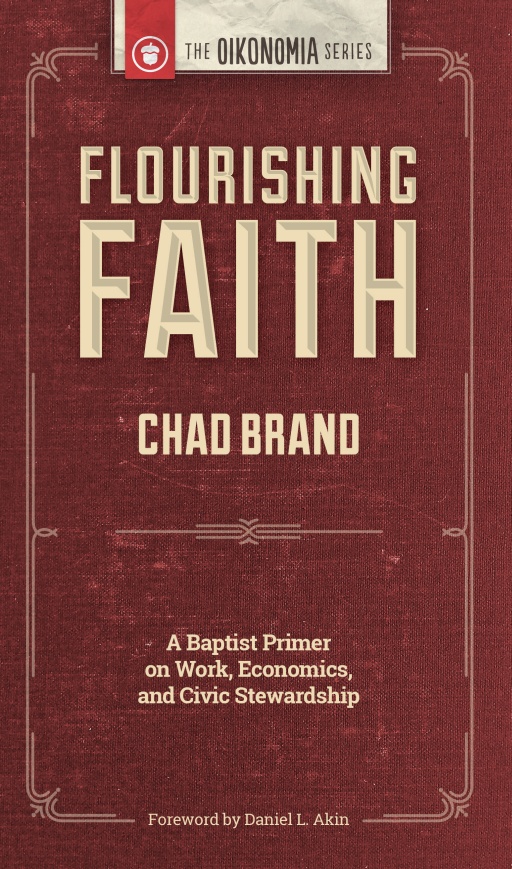 I recently pointed to a helpful talk by Greg Forster to highlight how understanding economics is essential for developing a holistic theology of work, vocation, and stewardship. Economics connects the personal to the public, and prods our attentions and imaginations to the broader social order. In doing so, it alerts us to a unique and powerful mode of Christian mission.
I recently pointed to a helpful talk by Greg Forster to highlight how understanding economics is essential for developing a holistic theology of work, vocation, and stewardship. Economics connects the personal to the public, and prods our attentions and imaginations to the broader social order. In doing so, it alerts us to a unique and powerful mode of Christian mission.
In his latest book, Flourishing Faith: A Baptist Primer On Work, Economics, And Civic Stewardship, Chad Brand expands on this point, listing five reasons why pastors and seminaries (and thus, lay people) would do well to dig deeper into the realm of economics. (The following titles are paraphrased summaries, with the corresponding text pulled directly from Brand.)
1. The Bible Deals with Economic Issues
First, the Bible deals with economic issues…It addresses matters of stewardship of our world (Gen. 1–3; Gen. 9:1–7), of God’s ownership of creation (Matt. 6:25–30; Col. 1:16–20), and of economic shalom (Lev. 25:1–55; Acts 2:42–47; 2 Thess. 3:6–10), and other important issues given more detailed discussion in [this book].
2. Economics Helps Us Understand the Public Square
Second, an understanding of economics and especially of political economy can help us understand what is going on in the world around us. The general election…is impossible to follow without some understanding of the implications of Obamacare and its impact on Medicare, the federal deficit, and the long-term effects of continued deficit spending. The posturing on the part of Republicans and Democrats sometimes seems like little more than rhetoric, but the one who understands what is really at stake can help lead people to a better understanding of their responsibility in the public square.
3. It Expands Our Model of Discipleship
Third, an understanding of economics can help us pastor our people more effectively by pointing to the need for a more comprehensive model of Christian discipleship. Many people in our churches just don’t grasp that wealth is produced through work, how that in itself is a blessing to others, and then what God calls them to do with their wealth, even if they have very little of it. Taking a money management course is important to becoming a mature steward, but what most need more than that is a framework for understanding how politics, economics, and citizenship responsibilities fit into a broader discipleship model of life stewardship. In other words, they need an introduction to biblical oikonomia (“the law of the house”). And this applies to pastors and seminary professors every bit as much as it does to members of the congregation. A good place to start is by imparting some understanding of supply and demand, of fruitfulness and pay, and of how investments work (just to give a small sampling), because this will help God’s people to grasp better the role they play every day in the broad sweep of God’s mission in the world.
4. It Enhances Our Theology of Work
Fourth, our people desperately need to understand what I have called here, a theology of work and economics. People go to their jobs, but often just see that as a necessary evil in their lives to satisfy their immediate needs. They need a bigger picture perspective on the fact that God made them, in part, to work, and that all legitimate work glorifies God and through its fruitfulness, in turn, is a blessing to countless others. Work is an aspect of image; human beings without a task or who are lazy are not reflecting the image of God in which they were created. Many Christians do not realize that work appears in the Bible in advance of the fall and is included in God’s evaluation of everything he had made, that it was “very good.” Thus work possesses moral value and worth that survives the fall and remains intact even after God curses the ground. …When we realize that when we work, we are tangibly representing aspects of who God is and what he is like by the work we perform as well as the way or manner in which we labor at our various tasks in life.
5. It Illuminates the Theological Implications of Politics
Fifth, we need to help people understand the theological implications of politics. All political positioning has theological implications, as we tried to show by examining Augustine, Thomas Aquinas, Calvin, and the Baptists. In my Baptist tradition the relationship between theology and politics sometimes is strained, but really every tradition has to deal with that strain in our world today. Still, people need to understand the fundamental dynamics at play.
For more, purchase Flourishing Faith: A Baptist Primer On Work, Economics, And Civic Stewardship.

